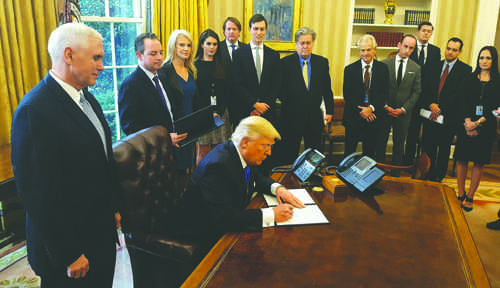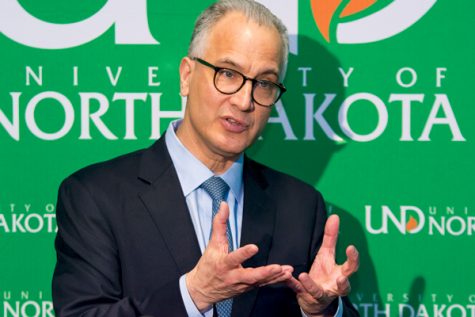Johnson Amendment

President Donald Trump has signed a flurry of executive orders since taking office, and repealing the Johnson Amendment, which prohibits non-profits including religious organizations from endorsing or supporting political candidates, is one of his next proposed targets. White House Official Photo
February 18, 2017
President Trump vows to “completely destroy” the Johnson Amendment
President Trump announced at the annual National Prayer Meeting Feb. 2 that he aims to “totally destroy” the Johnson Amendment in an effort to protect free speech for the nation’s religious leaders.
The Johnson Amendment, signed by President Eisenhower in 1954, prohibits 501(c)(3) non-profits (such as churches) from campaigning for specific candidates in political races.
If a non-profit were to do so, they would risk losing their tax-exempt status. Though the Johnson Amendment had been a target for the Trump campaign, this is the first the President has publicly spoken of it while in office.
As the amendment stands today, religious leaders are not limited in their ability to campaign as a single citizen, only from endorsing specific candidates from the pulpit.
“Of course, I have a personal opinion about how the government should be involved in our lives, but my call to be a pastor is to serve the gospel.”
— Rev. Dr. Mark Bucchop
Even that restriction can be flexible. According to Robert Wood, Associate Professor of Political Science and Public Administration at the University of North Dakota, “in practice, enforcement has been very low.”
Wood goes on to say that while he can recall select times in high-profile cases when churches were threatened with the loss of their tax-exempt status, he “can’t think of a single example” of when a non-profit actually has faced legal consequences for political speech.
Rev. Dr. Mark Buchhop, pastor of the on-campus Wittenberg Lutheran Chapel, holds strong opposition to political activity within the church.
“Of course, I have a personal opinion about how the government should be involved in our lives,” Bucchop said, “but my call to be a pastor is to serve the gospel.”
Though he is personally against the politicization of religious services, Bucchop claims that “it is already being done routinely” and he feels that Wittenberg’s stance on the issue “sets [them] apart from a lot of churches.”
Because the government has been conservative in their enforcement of the Johnson Amendment, many commentators reject President Trump’s premise that his goal in abolishing it is to simply protect free speech. Professor Wood not only calls the promise a “gimmick,” but also points out the financial implications that getting rid of the Johnson Amendment would have on campaigns.
If a non-profit like a church were to be able to directly campaign for and support political candidates, that entity would also be able to freely donate money to candidates without disclosing their individual donors.
Effectively, abolishing the Johnson Amendment could turn churches into PACs and create a “whole new avenue for dark money,” a phenomenon that Wood says is one of the “biggest concerns in our modern political system.”
In order for President Trump to fulfill his promise, a Republican-controlled Congress will have to approve a bill to abolish the Amendment. However, this is an issue that Democrats, particularly those in the Senate, are predicted to fight hard on.









